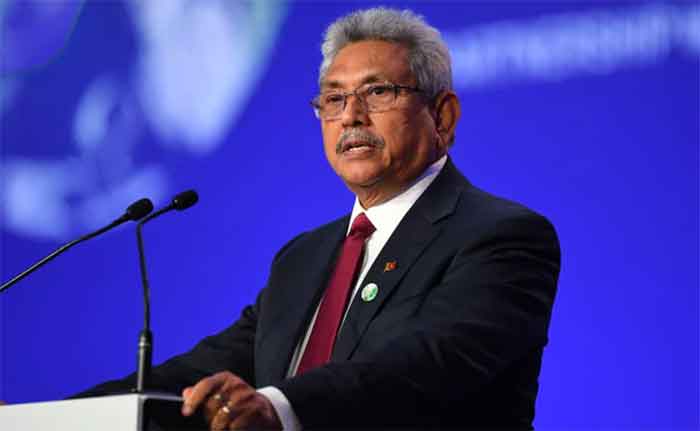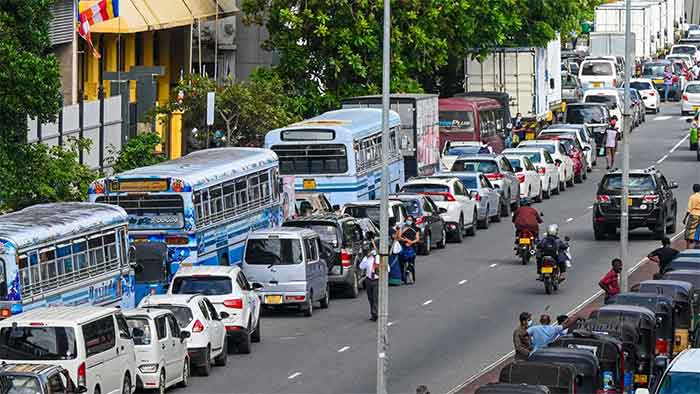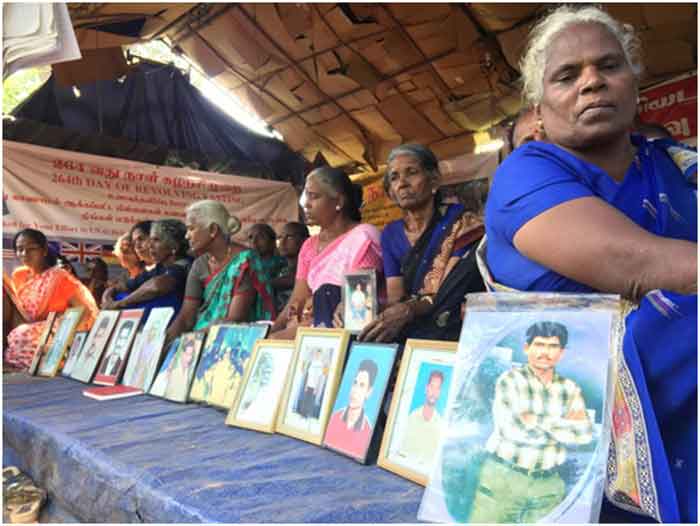
Sri Lanka’s former president Gotabaya Rajapaksa is expected to return to the country from Singapore, a Sri Lankan lawmaker says.
Cabinet spokesperson Bandula Gunawardena told reporters on Tuesday that G Rajapaksa was not in hiding but the date of his return was not known.
The former president fled Sri Lanka after mass unrest over an economic crisis.
Many protesters say he mishandled the nation’s finances, leading to soaring prices of essential goods.
Rajapaksa left Sri Lanka on 13 July for the Maldives, before making his way to Singapore on 14 July.
He submitted his resignation shortly after his arrival, which was formally accepted by the Sri Lankan cabinet on 15 July.
The former president travelled with his wife and two bodyguards. He no longer has legal immunity as a head of state.
Singapore says the ousted president did not ask for political asylum when he arrived.
Rajapaksa had been initially granted a 14-day visa for his stay in Singapore. But that has now been extended another 14 days, Singapore local media reported on Wednesday.
Indian PM Congratulates Lanka President; Assures Support
Indian Prime Minister Narendra Modi has congratulated Sri Lanka’s newly-elected President Ranil Wickremesinghe and said that India will continue to be supportive of the quest of the people of the island nation for stability and economic recovery, through established democratic means, the Indian High Commission said on Tuesday.
Chinese PM Congratulates SL’s New PM
Chinese Premier Li Keqiang on Tuesday sent a message to Dinesh Gunawardena to congratulate him on taking office as Sri Lankan prime minister.
In his message, Li said that China and Sri Lanka enjoy a profound traditional friendship, and are friendly neighbors and strategic cooperative partners.
Since the establishment of their diplomatic ties 65 years ago, the two sides have always treated each other with respect and as equals, continuously strengthened mutual political trust and promoted mutually beneficial cooperation, and joined hands to deal with difficulties and challenges, said Li, adding that bilateral relations have maintained sound and steady development.
The Chinese side firmly supports the friendly cooperation between China and Sri Lanka, empathizes with the Sri Lankan people regarding the current difficulties facing them, and stands ready to continue to provide them support and assistance within its capacity, Li said.
The Chinese premier said he would like to work with PM Gunawardena to strengthen solidarity and mutual support among developing countries, and deepen practical cooperation in various fields, so as to bring more benefits to the two countries and their peoples.
Soup Kitchens Feed Poor
A Reuters report said:
With no fuel and no money for food, H G Indrani and her family of nine trudged for an hour to a community kitchen in Colombo, in hopes of finding a simple vegetarian meal.
Rampant food inflation and chronic shortages of cooking gas and petrol are making daily life a battle for millions in the midst of Sri Lanka’s worst economic crisis since independence from Britain in 1948.
“There is no income,” said Indrani, one of hundreds queuing in the midday sun at a makeshift kitchen run by a church. “There is no food most of the time, we have been suffering a lot.”
Food Inflation Soared To 80 Percent In June
A WFP Sri Lanka Country Brief, June 2022 (26 July 2022, https://reliefweb.int/report/sri-lanka/wfp-sri-lanka-country-brief-june-2022) said:
- The population continues to feel the brunt of the economic and food crises, as food inflation soars to a staggering 80 percent in June 2022.
- An alarming 6.3 million people (about 3 in 10 households) are now food insecure, according to preliminary findings from WFP and FAO’s joint Crop and Food Security Assessment Mission. Of this number, 66,000 people are severely food insecure.
- The majority of households (61 percent) are regularly using food-based coping strategies such as eating less preferred, less nutritious food, and cutting back on food portions. About 6.7 million people are not consuming adequate diets and 5.3 million people are reducing the number of meals eaten.
- Food security situation is worse in the estate sector. While urban households are depleting savings to cope for now, estate populations are already turning to credit in order to purchase food and other essentials.
CID Arrests Protester ‘Danish Ali’
A media report from Sri Lanka said:
The Criminal Investigation Department (CID) of Police arrested a protester who forcibly entered Sri Lanka’s state television, the Sri Lanka Rupavahini Corporation on 13 July when he attempted to flee the country today.
The CID arrested ‘Danish Ali’ at the Katunayake Bandaranaike International Airport when he was attempting to leave the country.
Police Media Spokesman said the suspect was arrested while trying to go to Dubai.
The police media spokesperson further stated that a court has issued a warrant for his arrest.
Crackdown On Protestors ‘Disheartening, Say Academics
A group of over 150 international academics recently issued a statement condemning the crackdown on protesters in Sri Lanka on 22 July, a day after new President Ranil Wickremesinghe took office.
Sri Lankan security forces raided the protest camp, set up in April on government grounds by angry citizens in response to the country’s unprecedented economic crisis which saw widespread shortages of food, fuel and other essentials, and cleared out a section of it early on 22 July.
Reports had come in of soldiers in riot gear marching through the area of the ‘Gota Go Gama’ camp – a jibe at ousted president Gotabaya Rajapaksa – and tore down the rows of tents which flanked the main road.
Protest organizers claimed that upwards of 50 protesters had been injured, while the government claimed that only two had been injured and nine arrested.
Videos also emerged online showing protesters being manhandled by troops.
Expressing their full condemnation of the state violence on the non-violent protesters, the academics, in the statement, noted that they were “aghast at reports that five of the protestors were abducted and tortured by security force personnel; violently beaten, forced to kneel on rocks and perform extremely tedious exercises whilst being threatened with death if they tried to escape.”
“Nine protest leaders were also arbitrarily arrested and detained by the police,” the statement read.
The academics also took note of the fact that the crackdown on the protesters came less than a day after incumbent President Wickremesinghe took charge, calling it shocking and saying that it “sends distressing signals of his method of governance”.
Protesters had decried Wickremesinghe election as President as he is seen as being close to the Rajapaksas, and had feared a crackdown after he assumed office.
“Over the last several months the protestors have been inspiring and disciplined in exercising basic democratic rights to call attention to the crisis. This space for resistance has also been used for educational purposes, with a university and library, advancing knowledge to all groups of people. The reference to protestors as ‘fascist’ is totally inaccurate, inappropriate and damaging; it weaponises the term to provide an excuse for the use of extreme force,” the statement reads.
With respect to the comment on “fascists”, the statement was referring to Wickremesinghe first public address after being sworn in as President, wherein he had called for an end to the “fascist threat to democracy” in the country and vowing to “restore normalcy”.
The statement described the crackdown on protesters as Wickremesinghe “following in the footsteps of his predecessors” and called it “deeply alarming”, noting how it adversely portrays the prospects the country is facing vis-a-vis its leadership.
“It is disheartening and telling that one of his first actions in office was to attack the people rather than take steps to address the suffering of the people,” the statement read.
As such, the statement laid out the demands of the undersigned academics, chief among them being for the Wickremesinghe government to desist from the use of force against the non-violent protesters and “reduce the current extreme military presence around the protest site at the Galle Face Green in Colombo and around the country including the north and east”.
Further, the statement called on the government to investigate the reports of the use of extreme force and torture against the protesters and hold those responsible for the same to account.
“The Sri Lankan constitution guarantees Sri Lankans fundamental rights including freedom of speech, expression and peaceful assembly; in addition, these are internationally guaranteed rights which Sri Lanka is committed to protect,” the statement concludes.
The government’s crackdown had garnered widespread backlash, even from the international community, with the American ambassador to Sri Lanka Julie Chung and British high commissioner to Sri Lanka Sarah Hulton expressing their concerns over the violence online.
Following the criticism, Wickremesinghe told Colombo-based foreign envoys that his government would allow non-violent protests in the country to continue.
“President Ranil Wickremesinghe has reaffirmed Sri Lanka’s commitment to upholding the rights of peaceful, non–violent assembly,” a statement from his office read.
















































